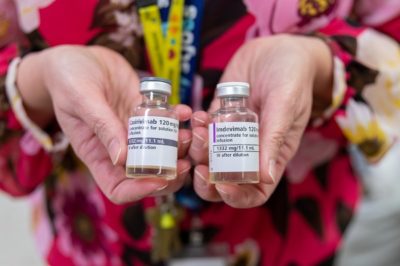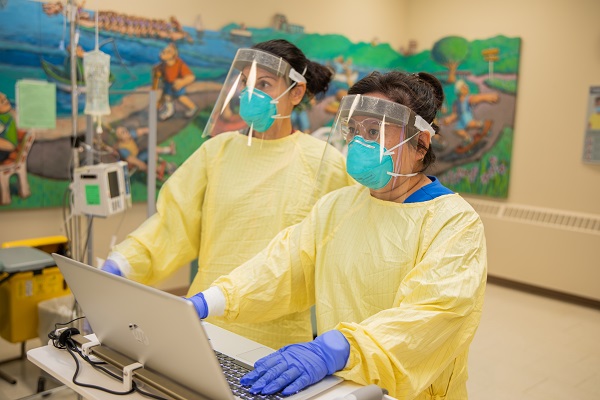By Arden Bagni-Fast
What images come to mind when you think about treating patients with COVID-19? Likely patients on ventilators, family members separated from loved ones, overwhelmed staff and overrun hospitals. It’s a disheartening picture, but what if we could avoid those experiences altogether by treating patients early in their disease progression? Good news: Healthcare providers at St. Joseph’s Healthcare Hamilton are doing just that in a new pilot program.
Dr. Zain Chagla, St. Joe’s Co-Medical Director of Infection Control, is leading a team that offers treatment for patients with early-stage COVID-19. It’s Ontario’s first dedicated clinic offering monoclonal antibody (MAB) therapy, and will help determine the feasibility of such a treatment center in other locations across the country.
Jumpstart the healing process
Antibody treatment isn’t new: We’ve used it for decades to treat patients at risk of rabies after being bitten by a rabid animal. In the case of MAB, antibodies latch onto COVID spike proteins, preventing the virus from invading healthy cells. And they work fast, giving our body a “shortcut to immunity” that clears the virus and prevents us from getting sick.
Those who are vaccinated already have COVID-19 antibodies stored, so the therapy would be ineffective. But patients who have not been vaccinated, or whose bodies did not respond appropriately to vaccinations, have not built up these antibodies, leaving them vulnerable.
“There are people who cannot create these antibodies,” says Dr. Chagla. “Not just those who are unvaccinated, but vaccinated individuals who are immune-compromised. They are most likely to be hospitalized with serious complications, but now we can give them synthetic antibodies to jumpstart the healing process.”

For now, Canada has access to this therapy delivered through a 30-minute intravenous infusion, but Dr. Chagla anticipates more products for early treatment of COVID-19 will be available in the future, including those that are available by intramuscular injection or oral capsules.
No substitute for vaccines
Dr. Chagla stresses that getting vaccinated is still the best line of defense. However, we have seen unprecedented levels of misinformation about the COVID vaccine, and various populations are skeptical of drastic government-mandated health policies due to historical mistreatment. Unvaccinated individuals are burdening our healthcare system, and other patients who need our hospitals’ resources aren’t able to access them: Across the country, surgeries are being delayed and healthcare workers are experiencing burnout. But Dr. Chagla sees this clinic as the start of a solution.
“We can save lives, and not just the patients who come into the clinic, but those who come to the hospital with other life-threatening circumstances. We are keeping those beds and resources available,” says Dr. Chagla. “It’s especially important now, as we enter one of the busiest times for hospitals (winter). If we can avoid being at critical capacity, that’s a win for everyone.”
Weighing safety and duty to patients
Initial feedback about the clinic has been overwhelmingly positive. It has also raised important considerations about allocating resources to unvaccinated patients during a pandemic.
“First and foremost, healthcare providers have a duty to treat patients,” says Dr. Chagla. “Leaving your bias at the door – whether you’re treating someone who is vaccine-hesitant or not – is important. We do this in other forms of infectious disease. If someone with HIV didn’t take the preventive measures available to them, we wouldn’t deny them care. We are here to help patients and use the evidence-based tools accessible to care for them the best way we can. And in this case, we are saving lives.”
Arden Bagni-Fast is a Public Affairs Specialist at St. Joseph’s Healthcare Hamilton.




